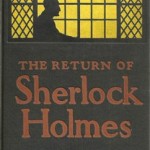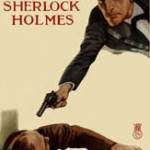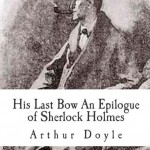“Let me see,” said Holmes, seating himself on Staunton’s bed. “You are the day porter, are you not?”
“Yes, sir, I go off duty at eleven.”
“The night porter saw nothing, I suppose?”
“No, sir, one theatre party came in late. No one else.”
“Were you on duty all day yesterday?”
“Yes, sir.”
“Did you take any messages to Mr. Staunton?”
“Yes, sir, one telegram.”
“Ah! that’s interesting. What o’clock was this?”
“About six.”
“Where was Mr. Staunton when he received it?”
“Here in his room.”
“Were you present when he opened it?”
“Yes, sir, I waited to see if there was an answer.”
“Well, was there?”
“Yes, sir, he wrote an answer.”
“Did you take it?”
“No, he took it himself.”
“But he wrote it in your presence.”
“Yes, sir. I was standing by the door, and he with his back turned at that table. When he had written it, he said: ‘All right, porter, I will take this myself.'”
“What did he write it with?”
“A pen, sir.”
“Was the telegraphic form one of these on the table?”
“Yes, sir, it was the top one.”
Holmes rose. Taking the forms, he carried them over to the window and carefully examined that which was uppermost.
“It is a pity he did not write in pencil,” said he, throwing them down again with a shrug of disappointment. “As you have no doubt frequently observed, Watson, the impression usually goes through—a fact which has dissolved many a happy marriage. However, I can find no trace here. I rejoice, however, to perceive that he wrote with a broad-pointed quill pen, and I can hardly doubt that we will find some impression upon this blotting-pad. Ah, yes, surely this is the very thing!”
He tore off a strip of the blotting-paper and turned towards us the following hieroglyphic:
Cyril Overton was much excited. “Hold it to the glass!” he cried.
“That is unnecessary,” said Holmes. “The paper is thin, and the reverse will give the message. Here it is.” He turned it over, and we read:
“So that is the tail end of the telegram which Godfrey Staunton dispatched within a few hours of his disappearance. There are at least six words of the message which have escaped us; but what remains—’Stand by us for God’s sake!’—proves that this young man saw a formidable danger which approached him, and from which someone else could protect him. ‘US,’ mark you! Another person was involved. Who should it be but the pale-faced, bearded man, who seemed himself in so nervous a state? What, then, is the connection between Godfrey Staunton and the bearded man? And what is the third source from which each of them sought for help against pressing danger? Our inquiry has already narrowed down to that.”
“We have only to find to whom that telegram is addressed,” I suggested.
“Exactly, my dear Watson. Your reflection, though profound, had already crossed my mind. But I daresay it may have come to your notice that, counterfoil of another man’s message, there may be some disinclination on the part of the officials to oblige you. There is so much red tape in these matters. However, I have no doubt that with a little delicacy and finesse the end may be attained. Meanwhile, I should like in your presence, Mr. Overton, to go through these papers which have been left upon the table.”
There were a number of letters, bills, and notebooks, which Holmes turned over and examined with quick, nervous fingers and darting, penetrating eyes. “Nothing here,” he said, at last. “By the way, I suppose your friend was a healthy young fellow—nothing amiss with him?”
“Sound as a bell.”
“Have you ever known him ill?”
“Not a day. He has been laid up with a hack, and once he slipped his knee-cap, but that was nothing.”
“Perhaps he was not so strong as you suppose. I should think he may have had some secret trouble. With your assent, I will put one or two of these papers in my pocket, in case they should bear upon our future inquiry.”
“One moment—one moment!” cried a querulous voice, and we looked up to find a queer little old man, jerking and twitching in the doorway. He was dressed in rusty black, with a very broad-brimmed top-hat and a loose white necktie—the whole effect being that of a very rustic parson or of an undertaker’s mute. Yet, in spite of his shabby and even absurd appearance, his voice had a sharp crackle, and his manner a quick intensity which commanded attention.
“Who are you, sir, and by what right do you touch this gentleman’s papers?” he asked.
“I am a private detective, and I am endeavouring to explain his disappearance.”
“Oh, you are, are you? And who instructed you, eh?”
“This gentleman, Mr. Staunton’s friend, was referred to me by Scotland Yard.”
“Who are you, sir?”
“I am Cyril Overton.”
“Then it is you who sent me a telegram. My name is Lord Mount-James. I came round as quickly as the Bayswater bus would bring me. So you have instructed a detective?”
“Yes, sir.”
“And are you prepared to meet the cost?”
“I have no doubt, sir, that my friend Godfrey, when we find him, will be prepared to do that.”
“But if he is never found, eh? Answer me that!”
“In that case, no doubt his family——”
“Nothing of the sort, sir!” screamed the little man. “Don’t look to me for a penny—not a penny! You understand that, Mr. Detective! I am all the family that this young man has got, and I tell you that I am not responsible. If he has any expectations it is due to the fact that I have never wasted money, and I do not propose to begin to do so now. As to those papers with which you are making so free, I may tell you that in case there should be anything of any value among them, you will be held strictly to account for what you do with them.”
“Very good, sir,” said Sherlock Holmes. “May I ask, in the meanwhile, whether you have yourself any theory to account for this young man’s disappearance?”
“No, sir, I have not. He is big enough and old enough to look after himself, and if he is so foolish as to lose himself, I entirely refuse to accept the responsibility of hunting for him.”
“I quite understand your position,” said Holmes, with a mischievous twinkle in his eyes. “Perhaps you don’t quite understand mine. Godfrey Staunton appears to have been a poor man. If he has been kidnapped, it could not have been for anything which he himself possesses. The fame of your wealth has gone abroad, Lord Mount-James, and it is entirely possible that a gang of thieves have secured your nephew in order to gain from him some information as to your house, your habits, and your treasure.”
The face of our unpleasant little visitor turned as white as his neckcloth.
“Heavens, sir, what an idea! I never thought of such villainy! What inhuman rogues there are in the world! But Godfrey is a fine lad—a staunch lad. Nothing would induce him to give his old uncle away. I’ll have the plate moved over to the bank this evening. In the meantime spare no pains, Mr. Detective! I beg you to leave no stone unturned to bring him safely back. As to money, well, so far as a fiver or even a tenner goes you can always look to me.”
Even in his chastened frame of mind, the noble miser could give us no information which could help us, for he knew little of the private life of his nephew. Our only clue lay in the truncated telegram, and with a copy of this in his hand Holmes set forth to find a second link for his chain. We had shaken off Lord Mount-James, and Overton had gone to consult with the other members of his team over the misfortune which had befallen them.
There was a telegraph-office at a short distance from the hotel. We halted outside it.
“It’s worth trying, Watson,” said Holmes. “Of course, with a warrant we could demand to see the counterfoils, but we have not reached that stage yet. I don’t suppose they remember faces in so busy a place. Let us venture it.”
“I am sorry to trouble you,” said he, in his blandest manner, to the young woman behind the grating; “there is some small mistake about a telegram I sent yesterday. I have had no answer, and I very much fear that I must have omitted to put my name at the end. Could you tell me if this was so?”
The young woman turned over a sheaf of counterfoils.
“What o’clock was it?” she asked.
“A little after six.”
“Whom was it to?”
Holmes put his finger to his lips and glanced at me. “The last words in it were ‘For God’s sake,'” he whispered, confidentially; “I am very anxious at getting no answer.”
The young woman separated one of the forms.
“This is it. There is no name,” said she, smoothing it out upon the counter.
“Then that, of course, accounts for my getting no answer,” said Holmes. “Dear me, how very stupid of me, to be sure! Good-morning, miss, and many thanks for having relieved my mind.” He chuckled and rubbed his hands when we found ourselves in the street once more.
“Well?” I asked.
“We progress, my dear Watson, we progress. I had seven different schemes for getting a glimpse of that telegram, but I could hardly hope to succeed the very first time.”
“And what have you gained?”
“A starting-point for our investigation.” He hailed a cab. “King’s Cross Station,” said he.
“We have a journey, then?”
“Yes, I think we must run down to Cambridge together. All the indications seem to me to point in that direction.”
“Tell me,” I asked, as we rattled up Gray’s Inn Road, “have you any suspicion yet as to the cause of the disappearance? I don’t think that among all our cases I have known one where the motives are more obscure. Surely you don’t really imagine that he may be kidnapped in order to give information against his wealthy uncle?”
“I confess, my dear Watson, that that does not appeal to me as a very probable explanation. It struck me, however, as being the one which was most likely to interest that exceedingly unpleasant old person.”
“It certainly did that; but what are your alternatives?”







